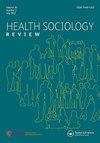Ascertaining patients’ understandings of their condition: a conversation analysis of contradictory norms in cancer specialist consultations
IF 3.1
2区 医学
Q2 HEALTH POLICY & SERVICES
引用次数: 2
Abstract
ABSTRACT Patient-centred care requires patients to be active participants in decision-making in consultations. Decision-making participation requires patients to understand their condition and to be able to convey their health literacy to medical specialists they encounter. Based on conversation analysis of 18 audio-recorded consultations between cancer patients and a range of cancer care specialists, this article analyses the ways cancer specialists attempt to ascertain their patient’s understanding of their disease. Cancer specialists routinely enquire about their patient’s understanding. In doing so, they phrase enquiries in different ways, resulting in different patient responses. How questions are phrased can require patients to deal with contradictory norms in the consultation, such as the patient being competent but not assuming medical expertise, and potentially hinder patient participation. Alternatively, questions can allow patients to draw on their own experience and so facilitate greater patient involvement. Questions aimed directly at the patient’s medical understanding result in minimal or negative responses. In contrast, questions directed at what the patient has been told or has experienced, elicit longer and more in-depth responses from the patient. This analysis illuminates the co-construction of cancer specialist consultations and suggests simple ways in which patient involvement in the consultation can be facilitated.确定患者对其病情的理解:癌症专科会诊中矛盾规范的对话分析
以患者为中心的护理要求患者积极参与咨询决策。参与决策要求患者了解自己的病情,并能够向他们遇到的医学专家传达他们的健康素养。本文通过对18段癌症患者与一系列癌症护理专家之间的咨询录音进行分析,分析了癌症专家试图确定患者对其疾病了解的方式。癌症专家通常会询问病人的理解程度。在这样做的过程中,他们以不同的方式表达询问,导致不同的患者反应。问题的措辞可能需要患者在咨询中处理相互矛盾的规范,例如患者有能力但不具备医疗专业知识,并可能阻碍患者的参与。另外,问题可以让患者借鉴自己的经验,从而促进更多的患者参与。直接针对患者医学理解的问题导致极少或消极的反应。相反,针对病人被告知或经历的问题,会引起病人更长、更深入的回答。这一分析阐明了癌症专科会诊的共同建设,并提出了简化患者参与会诊的方法。
本文章由计算机程序翻译,如有差异,请以英文原文为准。
求助全文
约1分钟内获得全文
求助全文
来源期刊

Health Sociology Review
Multiple-
CiteScore
7.50
自引率
0.00%
发文量
14
期刊介绍:
An international, scholarly peer-reviewed journal, Health Sociology Review explores the contribution of sociology and sociological research methods to understanding health and illness; to health policy, promotion and practice; and to equity, social justice, social policy and social work. Health Sociology Review is published in association with The Australian Sociological Association (TASA) under the editorship of Eileen Willis. Health Sociology Review publishes original theoretical and research articles, literature reviews, special issues, symposia, commentaries and book reviews.
 求助内容:
求助内容: 应助结果提醒方式:
应助结果提醒方式:


